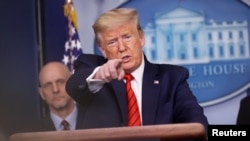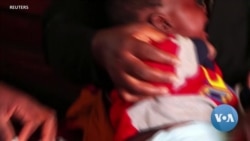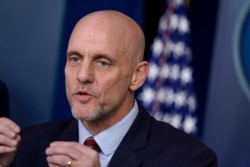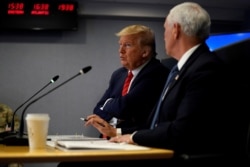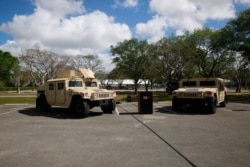U.S. President Donald Trump is touting two drugs as possible COVID-19 treatments.
Speaking to reporters at the White House on Thursday, Trump said chloroquine — an old drug used to treat malaria — “has shown encouraging early results against the virus. We’re going to be able to make that drug available immediately” by prescription.
“It’s been around a long time, so if things don’t go well, we know it won’t kill anyone,” said the president, who described chloroquine as a possible “game changer.”
Remdesivir, developed as a treatment for Ebola and Marburg viral infections, also is to be reviewed by the Food and Drug Administration for COVID-19 treatment, Trump said.
The FDA commissioner, Dr. Stephen Hahn, however, stated that the two drugs would have to undergo large clinical trials before they could be generally prescribed to treat COVID-19.
Hahn also mentioned the potential of “convalescent plasma,” calling it “a pretty exciting area.”
“If you’ve been exposed to coronavirus and you’re better, you don’t have the virus in your blood. We could collect the blood,” Hahn said, cautioning that this is a “possible” but not “proven treatment.”
These therapies are the best hope to combat the coronavirus sweeping the world, as approval for any vaccine could take as long as 18 months.
The White House’s coronavirus coordinator, Dr. Deborah Birx, cautioned that the number of confirmed COVID-19 cases would spike in the next two to three days as testing continues to escalate.
“It’s a medical war. We have to win this war,” Trump said.
Surgeon General Dr. Jerome Adams, a vice admiral in the U.S. Public Health Service, appealed from the White House podium for people across the country to donate blood.
“One donation can save up to three lives,” he said.
Vice President Mike Pence, who heads the coronavirus task force, announced that tens of millions of N95 respirator masks produced by 3M since January are available and can be sold to hospitals, regardless of whether they were intended for use in other industries.
Shortage of resources
Governors and members of the medical community have been warning there is a shortage of resources to handle the onslaught of cases of seriously ill people they expect to confront in the weeks and months ahead.
Trump spoke to U.S. state governors Thursday afternoon from Federal Emergency Management Agency headquarters in Washington.
The governors of Georgia and New Jersey, Brian Kemp and Phil Murphy, respectively, were among those who asked for block grants from the federal government to help states respond to the virus. Trump said he’d consider it “strongly.”
Louisiana Governor John Bel Edwards said that his state has one of the highest per capita virus levels and that he feared the virus would exceed the capacity of state’s health care structure to handle it in as soon as seven days. He asked for help dealing with the surge.
Rhode Island Governor Gina Raimondo asked for hospitals to get aid in the next stimulus round, as they’ve suspended their elective surgeries, a lucrative source of income.
Nebraska Governor Pete Ricketts expressed concern about the lack of reagents to process coronavirus tests and also told the president that child care facilities were needed for first responders.
Auto, hospitality industries
Michigan Governor Gretchen Whitmer thanked Trump for his policy on closing the Canadian border. She also discussed concerns about the auto industry, and liquidity up and down the supply chain. The president said he would be taking care of the automotive sector, which is a core industry in Michigan.
Trump called Nevada Governor Steve Sisolak’s appeal for help for the hospitality industry a “great idea,” adding that it was something that would be considered.
Utah Governor Gary Herbert suggested that “we hear more optimism” and suggested people during the pandemic explore more outdoor recreational opportunities, such a golf.
More than 13,000 people in the United States have been diagnosed with COVID-19, and the disease has killed at least 168 in the country.
Two members of the House of Representatives have tested positive for the coronavirus, prompting other legislators they came in contact with to put themselves into isolation at a time Congress is working on additional relief measures.
Cash 'injection'
Senate Majority Leader Mitch McConnell said Thursday that “a rapid injection of cash" was needed to help small businesses through this turmoil.
“We need to take bold and swift action as soon as possible,” McConnell said on the Senate floor Thursday as he announced a plan to give direct cash payments of $1,200 per person and $2,400 per couple.
The Trump administration has said it would like to get money back in people’s pockets within weeks.
The McConnell plan also includes relief for small businesses and others and is expected to cost $1 trillion or more.
“We don’t want to pick winners and losers. We want everybody to benefit,” the president said.
Airlines and the cruise ship and hotel industries will be aided, “and we will be helping small businesses,” he said.
The Airlines for America trade association said the industry needed “immediate financial assistance” to protect the 11 million jobs it directly represents or supports.
As members of the National Guard across the country helped deliver meals and transport coronavirus testing kits, the Guard’s military chief cautioned that federalizing those troops “would not make sense” to assist with the nationwide coronavirus response.
The best use would be to keep them under the control of governors for a fast response, General Joseph Lengyel said.
“If you were to federalize then, you would lose that ability," Lengyel said, adding that the Guard’s current ability to assist police within their states would also become prohibited under the Posse Comitatus Act, which forbids U.S. military forces under direct control of the president from carrying out law enforcement actions.
'Ideal' source of help
Lengyel called the National Guard the “ideal military component to assist with a response” because its 450,000 members are “already there in the communities where these events are taking place.”
Every U.S. state, territory and the District of Columbia have declared states of emergency.
More than 2,000 guardsmen in 27 states already are helping respond to the coronavirus pandemic, Lengyel said, and the number of guardsmen activated for this crisis is expected to double by the end of the week.
“With COVID-19, it's like we have 54 separate hurricanes in every state, territory and the District of Columbia,” he said.
Patsy Widakusawara at the White House, Carla Babb at the Pentagon and Kenneth Schwartz in Gaithersburg, Maryland, contributed to this report.




